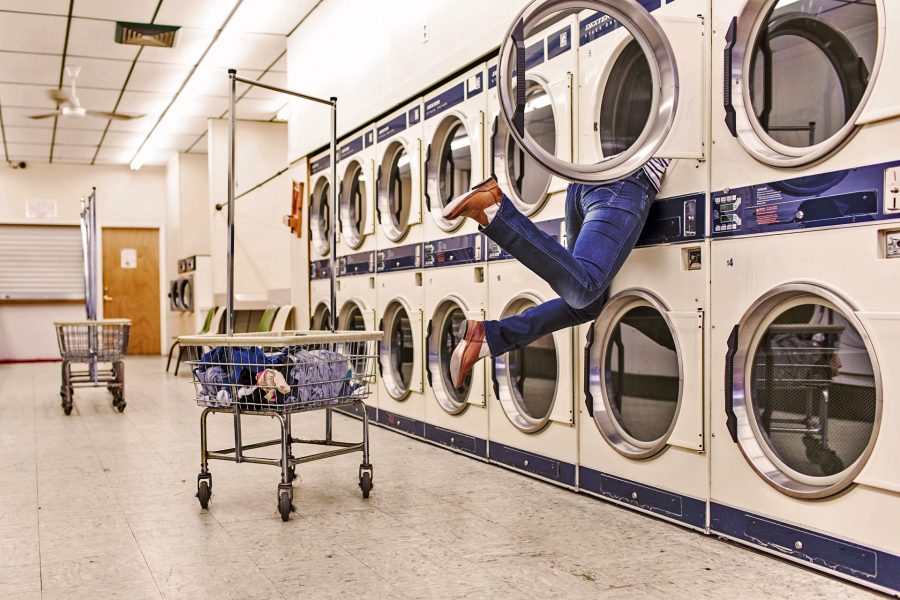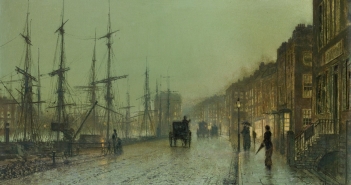The Jehovah’s Witnesses were driving me crazy with their too-polite knocks and damnation pamphlets. Maybe they earned extra credit for early morning salvation attempts? I was always too sleepy to answer and peeked thru the peephole at their church lady hats and cheap briefcases as they walked to the curb. Martha at the hardware store was one. She had hair she could sit on and I saw her eating a bowl of cereal on the bus. She once showed me a little laminated card in her wallet – NUNCA SANGRE – blood transfusions were not allowed even if you were dying in the street.
Maybe the Jehovah’s did the math and figured the odds were on their side; after dozens of mornings of relentless knocking, I answered the door on Saturday. With dripping hair and wrapped in a towel, I swung the door open dramatically.
“Good morning,” said the lone guy who was most definitely not a Jehovah’s Witness.
“Oh,” I answered, my hand reassuring the knotted terrycloth around my chest.
“This actually happens all the time,” the young man said. His hair was the color of a manila envelope and obviously cut while blindfolded. His eyes were the most boring eyes in the world – just dots really – but his smile was so ridiculous, so dazzling – like a movie star, like a billboard for toothpaste.
“I was praying the towel would finally scare off the Witnesses,” I blurted out.
“I’m not scared, but I’m not one of them.” He held up clipboard; a pencil on a string dangled from it. “I ask questions.”
“Door to door?” I asked. “Door to door,” he nodded.
He was wearing a light blue workshirt with an embroidered ACME patch over the pocket. It seemed vaguely professional.
“I will answer your questions,” I told him. “Come with me to the Laundromat and ask me questions from your clipboard.”
He followed me into the kitchen. The small TV on the counter was turned to the Spanish soap opera. Louisa shouted at Ricardo – “Donde esta mi madre?” – I pushed some magazines off the second chair and Acme sat down. “I watch this to keep my Spanish from getting rusty. The main thing to remember is that ‘Estoy embarazada’ does not mean what it sounds like. It means ‘I’m pregnant.’ I found out the hard way.”
Acme laughed.
I spooned two tablespoons of instant coffee into two mugs and poured boiling water from a small saucepan. The brown grains swirled to the surface until I propellered the spoon and they dissolved with the heat. I handed Acme his coffee and grabbed an elementary-school-lunch-sized milk carton from the almost empty refrigerator. “Have you seen me?” was written on three sides, next to a postage stamp of a photo of a girl with a crooked smile and startled eyes.
I plopped down in the other kitchen chair and we sipped our coffee. “You are still in your Jehovah’s Witness towel,” Acme pointed out.
“I know. I do laundry every Saturday. Every piece I own except this towel. We can wheel over to the Laundromat after coffee.”
“Not that I mind,” said Acme. “I just wondered.” He noisily slurped his coffee. “This is probably the worst coffee I’ve ever had.”
I laughed. “The coffee at the Laundromat is even worse. Somehow you can even taste the styrofoam cup.”
We sat quietly. Outdoor sounds squeezed in through the half-opened window – a man coughing, an outburst of barking, a plane jetting overhead and then fading away. I tucked my feet under my chair and slid them back out on top of white canvas tennis shoes, the backs bent in, flattened. Using my pointer finger as a shoe horn, I
wedged on the still doubled knotted sneakers.
“Ready for our adventure?” I asked, as I buttoned up my raincoat over the Jehovahs Witness towel.
The wire grocery cart was waiting next to the front door; the lumpy cloth laundry bags oozed through the slats like mashed potatoes.
Acme grabbed his clipboard and we wheeled the cart down the sidewalk towards the Laundromat. The handfuls of laundry quarters in my coat pockets rattled as I tripped over every bump in the cement I did not see.
“Ok, first question – why are you just wearing a towel and washing all your clothes at once?”
I sighed. “The Four F’s, I guess. Fire, flood, famine, father.”
Acme looked confused. “Five F’s – one is for follow up. Please.”
I rolled my eyes. “My dad was a fireman so he drilled it into me to always be prepared.”
“Prepared for what?”
“Prepared for anything. To save time, to escape as quickly as possible. At night I got my breakfast 90% ready – cereal poured into the bowl, two pieces of bread poised in the toaster, the pre-buttered knife diagonal on the plate. All I had to do in the morning was push the toaster button.
“He would do time trials to see how long it would take me to get out of the house. I never knew when they would happen. Sometimes the smoke alarm would go off after midnight. I once caught him standing on a chair in the hallway, exhaling an entire pack of cigarettes in front of the smoke detector.
“Every rung of the escape ladder shook as I climbed down in the dark. The blackness was only broken by my father directing his powerful flashlight at me, like one of those helicopters looking for fugitives from the sky.
“A few times he blasted the referee in a can – that metal tube with a horn attached. He stood in the driveway and squeezed it mercilessly. Of course the neighbors hated him. And he used a stopwatch. I wore my nightgown over my school clothes. It helped me feel at least outwardly normal. It also cut seconds off my escape time.
“No matter how often the drills happened – sometimes it was months between them and other times they were back to back – there was a constant fear of sleep. Each drill was a crazy adrenaline rush. I needed to run off the extra energy surge and I’d stand in the dark living room and jog in place until I was finally exhausted.”
“Jesus,” Acme said, shaking his head.
“My father wrote down my times in a pocket notebook he kept with him at all times. Rows of numbers, colored pencil charts and graphs. It wasn’t until he disappeared, the day he emptied his pockets onto the kitchen counter and calmly walked out the door, that I began to under- stand what he had done. How he had negated every single day for a future of emergency and disaster that never happened. I realized how much time was lost, wasted.
“He unplugged every lamp, every appliance, but the refrigerator, at night. He blamed faulty electrical work for most household fires. I learned to see in the dark, to feel my way around the house, to trace the outline of furniture, doorways, with my hands; count out the necessary steps to the bathroom. It was like living in a Braille coloring book. I slept with the curtains open to get even a sliver of street light into my room.”
“Did you ever sleep?” Acme asked.
“I learned to sleep at weird times in weird places. Snoring in the shower, catnaps in the cafeteria. Even now, beds seem dangerous. I still make my bed with all the sheets at once, one on top of the other. That first night, it’s like I’ve built a force field around me. And every morning, I peel off a layer, like an onion, and my protection shrinks by that precious millimeter.”
We paused at the intersection. Acme turned towards me, the sun blazing and outrageous behind him. Suddenly his hair was orange, like it was on fire and his skin was transparent. Red and blue veins that had been invisible suddenly made a nonsensical roadmap of his forehead, his neck. It was as if he had been turned inside out.
He was talking to me, but I was tuned out, distracted by the gentle pulsating in his temple. His talk no longer words but just sounds, like the teacher in Charlie Brown. Then I noticed the blood trickle, ever so slowly, from his nose, outline his upper lip and then drip down his chin and onto his blue shirt. The blood blossomed into a spidery red flower. My eyes refocused, and startled, I asked, “Are you ok?”
Acme reflexively rubbed his face, smearing the blood with his fingertips, then looked at his hand. “I’m sorry. It happens.”
I poked around in my dirty laundry and handed him a gym sock. “Thanks. People around here are used to it. Sometimes they even seem kind of disappointed if I don’t bleed.” Wearing my sock like a puppet, Acme tilted his head back and pinched his nostrils. The blood soaked his fingertips and striped the white cotton sock on his arm.
Acme and I stopped on the sidewalk, his head tilted back, looking at the sky, hoping for gravity to stop the blood. A bowlegged woman in a terrible housecoat was waiting outside the Laundromat, her tiny dog impatient and tangled around her concave ankles. At her feet, a thank-you-for-shopping-here plastic bag was dropped, a box of popsicles melting into a rainbow puddle. A few noisy bees and a line of ants were drinking in the sweet decay. The dog was licking its feet.
“We’re here,” I laughed and pushed open the door. I wheeled my overloaded cart in like a drunk driver.
“Good morning, young lady,” called out Miss Helen, the attendant.
She was the oldest woman in the world, a skeleton really, ruling in her secondhand upholstered armchair, aluminum TV tray at her side. Miss Helen wore plaid polyester pants and a faded sweatshirt, a fistful of tissues tucked underneath one wristband. Nobody had ever seen her out of that chair.
Acme looked at Miss Helen and whispered, “Is it really her job to sit there all day?”
“She runs a tight ship. Her dead husband opened this place a million years ago.”
I walked over to Miss Helen. “I’m renting one of your
National Enquirers until my laundry is done,” I said, and tossed a quarter into the mayonnaise jar on her tray. She nodded. I waved the yellowed tabloid in the air: Dolly Parton Shocker! “This looks good!”
The Laundromat was a big square bisected by a long countertop on skinny legs. On one wall were the port- holes of the industrial washers and on the other leg of the L, were the dryers. A row of molded plastic chairs, segmented like a caterpillar, ran along the steamy windows.
Acme, still pinching his bloody nose, looked around fascinated. He watched the woman leaning against a washer, holding a paper cup, ringed with old coffee like an ancient tree. Her movements were slow and stiff, a rusted robot, as she brought the cup to her lips. “It’s like a meeting of Sleepwalkers Anonymous in here.”
“It is another world,” I agreed. “Planet Fluff and Fold.”
I dumped my laundry onto the big table and sorted it into piles to wash. Acme talked, the gym sock muffling his voice, like a kid trying to do impressions. The blood on his shirt was growing, climbing its way across his chest. “I think my nosebleed finally stopped but my shirt looks like a crime scene.” Acme slowly unbuttoned his shirt with wet fingers, dotting the fabric with bloody halfmoons. “Tshirt too,” I commanded.
He sat there, shirtless in the plastic chair, looking at his reflection in the round glass of the dryer door and wiping his nose with the sock. His skin was so pale, he glowed.
“No shirt, no shoes, no service,” I reminded him, pointing to the cardboard sign scotch taped to the wall. “Miss Helen is very strict about topless customers. That’s why I wear my trenchcoat.” I handed him a bedsheet. He knotted it around his neck like a cape.
He washed the blood off his face in the water fountain, his features distorted like a funhouse mirror in the molded metal. Then he held his shirt above the spout and the arc of water blasted clean the center of the bloody stain. The shirt turned brown, then pale, then a rusty shadow. He tossed the wet shirts into the drum of the washer and they thwacked solidly, like a fish slapped onto a dock. The quarters activated the machine and it gradually came to life – the steady bursts of water, the sporadic release of detergent, the increasingly rhythmic agitator.
Acme in his cape, me in my towel – we quietly watched the portal of the washing machine as if it was the most fascinating movie in the world. It was soothing and hypnotic.
“I told you about the midnight ladders and why I am sitting here, now, with you, in a Laundromat. So how did you start going door-to-door with your clipboard asking strangers questions?”
“See that guy over there?” Acme asked. “The guy in the grey space suit?” He tilted his head toward the fat man folding dozens of pairs of underwear into tidy origami packets. He was wearing a puffy plastic jumpsuit, with thick elastic cuffs at the wrists and ankles. It was like elephant skin.
“That’s George. The first time I saw him I was eight-years-old and assumed he was an astronaut. He was in his front yard, raking leaves in his inflatable suit.”
George was whistling. I noticed the rubber gasket with a big knob, attached at the belly button, on his crinkly jumpsuit. I suddenly realized it was an inflatable sauna suit from the back of Parade Magazine, the kind that plug into the vacuum cleaner hose for extra reduction powers. “I always wondered who actually bought those diet suits,”
I said to Acme. “The FDA outlawed those things when people got dehydrated and passed out in the middle of Kmart.”
Acme said, “George never seems to get any smaller but he always seems hopeful, even when his suit is deflated. He stopped wearing real clothes decades ago. He even wears it grocery shopping. When I saw him pushing that cart filled with paper towels and Tang, I assumed he was an off-duty astronaut. That’s the beauty of a uniform, even a half-baked one – your identity is never questioned.”
I watched George methodically pairing up his clean tube socks, his plastic suit rustling loudly like candy wrappers in a movie theatre.
“I’d see George,” Acme continued, “and shyly ask him questions about outer space because I was obsessed with the moon. George never actually said he was in NASA, never once agreed with my crazy science fiction-fueled theories. But he never said no either, never denied my assumptions. I’d ask him stuff like ‘What’s it like up there?’ and he’d answer ‘Dark. And, ummm…cold?’”
“Did the other kids think he was an astronaut too?” “I was never sure,” Acme answered. “I felt like it was our special connection, that I was the only one smart enough to guess his top secret secret. After all, it’s more exciting to talk about peeing in zero-gravity than sitting in a broken Barcalounger and watching Wheel of Fortune all day. It was a secret that made us both happier.
“A few years later I found a balled up polyester Burger King uniform in a bus stop. It smelled like a million french fries. I’m not sure why, but I pulled it over my Tshirt and wore it home. Strangers asked me questions about my job, like if I could drink unlimited milkshakes. Just by putting on a different shirt, I became a different person. It seemed so easy, maybe too easy, to not be me. Suddenly I understood George, and how it was easier to just go along with things.
“I wondered who else I could become. I looked for mechanics shirts at the thrift shop. I’d find supermarket cashier smocks abandoned on sidewalks in a minimum wage rage. I had a drawerful of termite exterminator sweatshirts and a faded lifeguard tank top. I’d put on a uniform and go to a part of the city I didn’t know and plop myself down in a coffee shop all day. People would ask me questions, treat me like an expert. It felt good to be an authority on something. I had been fired from every real job I had ever had. I was a pizza delivery guy with no sense of direction. I somehow left open all the ferret cages at the pet shop and couldn’t mow a straight line at the golf course.”
I laughed and turned to look at Acme. He was staring straight ahead at the washing machine as he spoke. He sighed and adjusted the bedsheet knotted around his neck. I looked at the washer. Framed in the shiny glass door, the wet white laundry was sloppy and spinning, suds dotted the water. A lonely red sock swirled among the towels and Tshirts, spiraling like a giant peppermint candy, first in one direction and then in reverse. The air was humid from the endless cycles of clothes dryers drying. Miss Helen dramatically fanned herself with a rolled up Weekly World News.
“But what made you stop answering questions and start asking them from door to door?”
Acme shifted in the plastic chair. “I was wearing a starched lab coat and a teenager offered me a cruller if I gave her a second opinion on her upcoming gall bladder surgery. I realized Readers Digest medical knowledge was a dangerous thing. So I told her I was a veterinarian. She was disappointed.”
A small boy in Batman pajamas set up a tiny bowling alley on the floor next to the industrial washers. We watched as he rolled a dirty tennis ball into a triangle of miniature boxes of Tide detergent from the vending machine. Some were full and some were torn open, and with each collision a cloud of grit and blinding dust exploded into the air like spores.
Sometimes when the ball missed the kid kicked the boxes over with his foot and satisfied, smiled.
Acme looked at me. “Those miniature detergents are just like the fun-size boxes of cereal I used to beg my father to buy for me. I loved to cut along the dotted lines and fold back the cardboard wings. It was like a camping trip in your hand.”
George sat across from us and rested a can of orange soda on the shelf of his stomach. The Laundromat got hotter with each load of clothes thrown into a dryer. His face was flushed and sweaty. George wiped his forehead with a bandanna then retucked it into the cuff of his suit. With each fidget his plastic space suit noisily suctioned and unsuctioned onto the molded plastic chair, breathing, moving, almost as if it was alive. I looked at George’s wrinkled wrists, imprinted with years of elastic, and I thought about all those years spent mummified in plastic, his body cut off from air, from the world, so much that it was gradually losing its elasticity, its color, that it was starting to resemble the plastic suit he wore like a suit of armor.
Acme pointed to Washer 17. “It’s winding down,” he said, as it did a lethargic last spin. He pulled out an armful of wet laundry and looked at it helplessly. “I need a dryer.”
I found one and he dumped it all in. The front of his bedsheet cape was heavy and grey with a circle of damp; the back hung and billowed. I pulled out quarters from the pocket of my trenchcoat and slid them into the slot. The wet laundry thumped clumsily as it slowly began to spin, picking up momentum. George slurped is soda. Acme leaned over and said quietly, “I’m scared George will become one of those shut ins who refuse to leave their vinyl recliners for years and eat cases of potato chips and their skin eventually fuses into the cushions. Somehow they lose themselves…”
I finished his sentence, “…and become a chair with a face.”
“Exactly,” said Acme. “It’s scary. George went from an astronaut to a Lazy Boy recliner all because of that stupid jumpsuit. It seemed like too much baggage. The gall bladder question – the responsibility – shook me up and I threw it all out, every uniform I had. But the Acme shirt seemed different. It was universal but somehow vague. I carried a clipboard and everything shifted. Strangers stopped asking me to diagnose the weird clanking in their dishwashers. I asked the questions.
“The first questions are always easy, to build up their confidence, like those $100 categories on Jeopardy. Then things snowball from specifics like ‘Left handed or right handed?’ to ‘Would you ever parachute into a volcano?’ to a zinger like ‘Tell me about the time you were most disappointed by your parents.’”
The dryers hummed and the washers thwacked all around us. The air felt thick with dampness and heat. The whole place had that yeasty smell of lint. Miss Helen shimmied in her chair and used both hands to lift her limp left leg over her right knee, an oddly ladylike gesture. Her left foot dangled and shook.
“I ran out of my own questions after the first week. I underestimated how excited people were to talk about themselves. No one was surprised, no one refused to answer. I started an endless master list of questions. I stole from everywhere – Cosmo magazine, crackpot pop psychology books, supermarket scandal sheets. Even Bazooka Joe comics. Somehow the randomness made it all seem oddly legitimate. I took some notes, but mostly the interviews became meandering monologues. I nodded a lot.
People finished, unburdened and exhausted. They even looked lighter and brighter, more buoyant. Some glowed.”
I looked at Acme. “It sounds like going to confession with scientist. And without the phone booth.”
“It is. And I even have the cape,” he said, flapping the bedsheet around his shoulders.
“Don’t underestimate the power of a cape or a trenchcoat.”
We watched the dryers spin. As the minutes passed, the wet clothes tumbled and incrementally fluffed up behind the glass doors, like whipped cream.
“Ask me a question,” I said, slightly dizzy from watching the dryers
“Here’s a good one. What’s your favorite vehicle?” “It’s a tie. A golf cart and a cement mixer.” “Why am I not surprised,” Acme said.
“I’m pretty predictable. So what’s yours?” “An elevator.”
“That does not count.”
“It counts. It moves.”
“Maybe I should borrow your demented dictionary,” I said.
The dryer spun, then paused, then noisily shifted gears for a final reverse spin. We watched the digital red numbers count down. Two minutes, then one. Click! The hot laundry crackled with electricity. I pulled at a knot of stuck socks, stretching them like saltwater taffy. Sparks fireflied into the air. Acme flapped his knotted bedsheet like a dimestore Dracula.
The windows of the Laundromat were dreamy and foggy. At eye level, circles and slashes were rubbed out by fingers to see the world outside. I took off my trench- coat. Side by side, we sorted the laundry. Faint ghosts of warmth pulsated from the piles of socks and shirts and skirts. I dug out Acme’s shirt, grabbed it by the shoulders and shook it out. It was hot – alive again – like skin, as I put it on.




